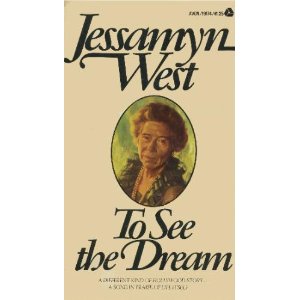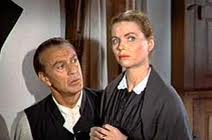Glen Huser’s Movie and Book Picks for July 2011
My Book Pick: To See the Dream
My good friend Merna Summers loaned me her copy of Jessamyn West’s To See the Dream after we’d talked about some of our favorite books as we drove from Edmonton to Calgary to take in a Writers’ Guild of Alberta conference. She knows about my passion for movies.
“I think you’d really enjoy West’s account of working on the film version of her Friendly Persuasion.” Merna also mentioned that she found West’s comments on the writer’s life and craft beautifully expressed.
Merna was so right. Somehow West’s memoir had managed to evade my radar for books recounting the transitions of novel into film – books such as Lillian Ross’s Picture, about the creation of John Huston’s The Red Badge of Courage from Crane’s Civil War novel; and George Bluestone’s Novels Into Film which looked at the filming of six classics including Pride and Prejudice and Wuthering Heights. The copy Merna loaned me is an Avon paperback from 1957 – and I don’t believe it’s been republished – but a quick check on Amazon confirmed that there are used copy available for sale. I’ll be getting an order in very soon – this is a book to reread and re-savor (and I know Merna will want her copy back).
What I especially loved about West’s memoir was the associative roaming from topic to topic as she maintained a diary during the months she worked on the film. Her feelings about her Napa home with its eucalyptus trees and noisy herons, the distinct sounds of the valley winds, her fondness for her leaky car with its winter sprouting of mushrooms on the backseat upholstery, the train-rides of her life, the books she was currently reading or re-reading (Thoreau was a favorite), the relationships of young and old and middle-aged – and between men and women – I was delighted by the tangential excursions as much as I was when she focused on the film-work. I am itching to keep a West kind of diary myself now and am wondering how best to manage it. Although I am reluctant to sit at the computer and write personal thoughts, I’m thinking I might give that a try, printing off each entry and compiling them somewhere so at least I can reread them without facing my Apple screen.
Of course, the major chunk of To See the Dream is about the making of Friendly Persuasion. Stuart Millar, William Wyler’s young assistant first coaxes West to simply come to Hollywood and meet with Wyler for a few days to discuss ideas for the film. Then they prevail upon her to write out how she sees the film unfolding, notes they turn over to a screenwriter. But the screenwriter’s attempts to jazz up the story send Wyler and Millar scurrying back to West and arranging with her to reclaim the project, working with Wyler’s brother to develop an actual screenplay. West chooses her battles and perhaps the biggest one is her adamancy that the Quaker father in the story remains true to his beliefs and does not end up as a hero of a skirmish between Confederate raiders and the Indiana home guard.
“This picture says that salvation isn’t a mass product,” West argues. “It says that you save or lose your soul as an individual. When people go out of the theaters after seeing this…if we succeed…they aren’t going to say ‘so what.’ They’re going to say, ‘That guy had guts. He did what he thought was right.’”
Later, as Wyler still considers giving Gary Cooper, who plays the father, more of the mantle his fans would expect him to don, She writes, “The characters who remain in our minds longest are those we are still trying to figure out.” Good concept for a screenplay, but also for anyone crafting fiction.
West, once the screenplay is finished, is retained as an advisor on the shoot (particularly to get the Quaker way of life as accurate as possible). When she leaves the shoot, she concludes her diary. My only complaint with the book is that I wanted another chapter – one in which she would give her impressions of the picture as it is screened for public viewing. What did she think of the Dimitri Tiomkin’s music and the omnipresent Pat Boone song “Thee I Love”? And what were her thoughts at not being credited as at least a co-writer of the screenplay (she is given an advisor credit). Blacklisted screenwriter Michael Wilson wasn’t acknowledged until later – and why is there no mention of him in To See the Dream?
 My Movie Pick: Friendly Persuasion
My Movie Pick: Friendly Persuasion
I have enjoyed watching Friendly Persuasion several times over the years since home videos first began to appear. Is it my favorite William Wyler picture? Well…how do you stack it up against those dark Bette Davis flicks — Jezebel, The Letter, The Little Foxes? Or the pictures he made during and just after World War II – Mrs. Miniver and The Best Year of Our Lives? The delicious Roman Holiday? Or The Big Country, sprawling in widescreen and color and Aaron Copeland music, offering Gregory Peck in a role not all that much unlike the one Cooper plays in the Jessamyn West story? The Heiress, an earlier pick of mine? Hard to choose.
But Friendly Persuasion is definitely a charmer.
If it were filmed today, it would probably be shot on location in Indiana, but Wyler is painstaking in the recreation – on a ranch outside of Los Angeles — of an 1860s Quaker farm with its rough-hewn buildings, a cornfield, a meandering stream. In To See the Dream, West writes about the trouble she went to in convincing the costumer and the set dresser that Quaker homes and clothing of the time were a far cry from the minimalism and austerity one would find in a Shaker setting. The interior of the Birdwell home is warm with quilted work, stitched samplers, patterned china, polished wood, lace runners, table lamps. And the costumes, while simple in design, offer us an array of textured fabrics and colors that celebrate the rich blues and dusky reds of sky and earth.
Wyler, as he was planning the film, had Gary Cooper fixed in his mind as the only possible Jess Birdwell. It makes the same kind of sense as Clark Gable being the only possible Rhett Butler a couple of decades earlier. Cooper is totally believable as a hardworking Quaker farmer who loves his family and his way of life. He is a man with a twinkle in his eye as he bends the rules of the society of Friends to enter into horse races with his neighbor, and accept a forbidden pump organ into his home. His stoicism, in the face of a marauding enemy, is heroic in the way that the author of the novel hoped it would be.
While Cooper is the kind of apt casting it would be hard to get wrong, I think it would have been very possible to come up short in choosing a perfect Eliza Birdwell, Jess’s wife. A huge number of actresses were tested for the part before Wyler settled on Dorothy McGuire. She takes on the role as if it were a second skin. McGuire has a kind of understated assurance that seems to serve cinema so well (over its cousin, the stage show), a voice that can make you readily believe she would be chosen as the preacher for the gathering of Friends, and eyes that are marvelously eloquent. The Academy Award nominations of 1956 passed her up (for the likes of Nancy Kelly in The Bad Seed!) but the National Board of Review honored her performance with their best actress award for the year.
The Academy did recognize Anthony Perkins who picked up a justly-deserved supporting-actor nomination for his portrayal of Josh Birdwell, Jess’s son, who does join in the Civil War battle, shoots Confederate soldiers, and is wounded himself. The gangly Perkins looks like he could have been Cooper’s son, and the anguish of his decision to bear arms against his family’s beliefs is heart-wrenching. Wyler, we have to believe, had a way of bringing out the best in an actor.
While there is much to laud in Friendly Persuasion, I do have some quibbles. A lighter touch with Tiomkins’ music – I would have been grateful for that. The scene with Marjorie Main and her love-hungry daughters – way over the top for a film of gentleness and subtlety. And I’m still puzzling over the beginning which has young Jess, the little boy in the Birdwell family, addressing the audience in a voice-over as he introduces us to Samantha, the goose that’s determined to maim him. It feels as if the film is going to be mainly a narrative about him – something that’s not borne out as the picture continues. I have a feeling no one asked Jessamyn West about this awkward ploy – obviously there to begin the show with a laugh.
Be forgiving though and treat yourself to a couple of enjoyable – and moving — hours with the Birdwell family.


We actually watched Friendly Persuasion on Turner Classic Movies this past winter. I was impressed with the film. I’ll be looking for a copy of the book To See the Dream now. Thanks.
You might have trouble finding a copy — but I’ll be ordering one from one of the second-hand sources available through the Internet, and I’m happy to loan it to you. I know you keep a journal, and I think you’ll really enjoy West’s impassioned reflections on the many aspects of daily living (even if your daily living doesn’t involve hobnobbing with Hollywood directors and stars!).
I take umbrage at your remarks about Marjorie Main. She is the spitting image of my grandmother – Iva Hopkins. Or vice versa.
I haven’t seen this film in years but it made a great impression on me when I saw it in high school. I’m afraid today it would be filmed in Afghanistan, and the Cooper character would show viewers that peacekeeping is useless when dealing with “the enemy.” What was new then is old now. Also vice versa.
I have a couple of relatives that could have been played by Marjorie Main too — maybe there are not that many degrees of separation between us, Dianne. I have to wonder if mankind has learned anything since the absolute carnage of the American Civil War.